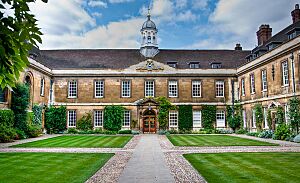Frederick James Quick facts for kids
Frederick James Quick (born 1836, died 1902) was a successful businessman in London. He sold large amounts of tea and coffee. He was also the head of a company called Quick, Reek, and Smith.
Frederick Quick was very interested in science, especially biology (the study of living things) and botany (the study of plants). He decided to leave most of his money to the University of Cambridge. This generous gift helped create a special position called the Quick Chair in Biology in 1906. This position was meant to support important research in biology.
Quick's Early Life and Education
Frederick Quick was born in London in 1836. His father, James Carthew Quick, was also a wholesale coffee dealer. Frederick was the second son in the family.
He went to Harrow School from 1851 to 1855. After that, he studied at Trinity Hall, Cambridge, starting in October 1855. He earned his first degree in 1859.
Frederick also studied to become a barrister (a type of lawyer). He even learned about farming in St Andrews. His father bought some land for him in Woodmancote, West Sussex.
Frederick's older brother, Robert Hebert Quick, also went to Harrow and Cambridge. He became a clergyman and a school teacher. This left Frederick to follow the family business path.
Quick's Business Career
Frederick Quick briefly worked as a partner in a tea business. In 1869, he became a partner in his family's company, Quick, Reek, and Smith. His father had started this company.
By 1881, Frederick was working as a wholesale coffee dealer. His father had retired to Brighton. When his father passed away in 1884, Frederick became the senior partner in the family firm. He led the company until his own death in 1902. People saw Frederick as a smart and far-sighted businessman.
Frederick was also friends with an artist and architect named James Edward Rogers. In 1896, Frederick helped manage his friend's will after he died.
Quick's Legacy and Science Support
Frederick Quick never married. His brother passed away before him. In 1901, he was living in Eltham, Kent, with two servants. He listed his job as a barrister.
Frederick Quick died at his home in Eltham in 1902. He left behind a large amount of money, valued at about £70,453. This would be worth much more today. He had asked for his body to be cremated, which means it was burned. His ashes were then buried.
Frederick was very interested in biology and botany. Because of this, he decided to use his wealth to create the Frederick James Quick Fund. This fund was set up to "promote Study and Research in the Sciences of Vegetable and Animal Biology" at the University of Cambridge.
The fund received about £50,000 from Quick's estate in 1903. The university used this money to create a new Quick Professorship of Biology. This new position focused on the study of protozoology, which is the study of tiny, single-celled organisms. George Nuttall was chosen as the first professor in 1906.
At first, Professor Nuttall worked in temporary rooms at the new Cambridge Medical School building. There, he set up a Quick Laboratory. Later, a special building was built just for the laboratory.
Frederick's brother had a son named Oliver Chase Quick (1885–1944). Oliver became a famous theologian and a professor at Oxford University.
 | Georgia Louise Harris Brown |
 | Julian Abele |
 | Norma Merrick Sklarek |
 | William Sidney Pittman |


